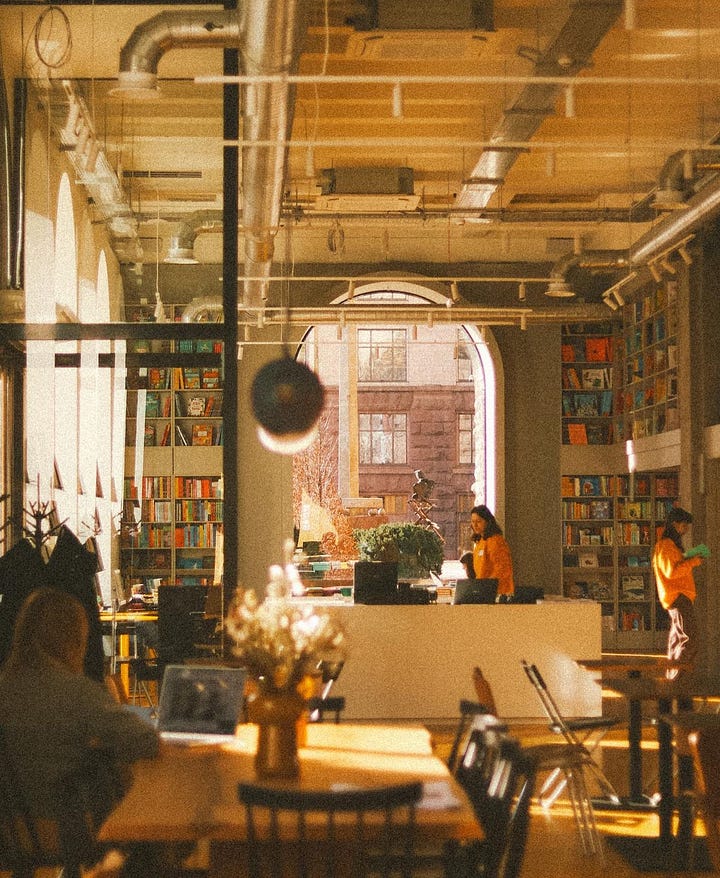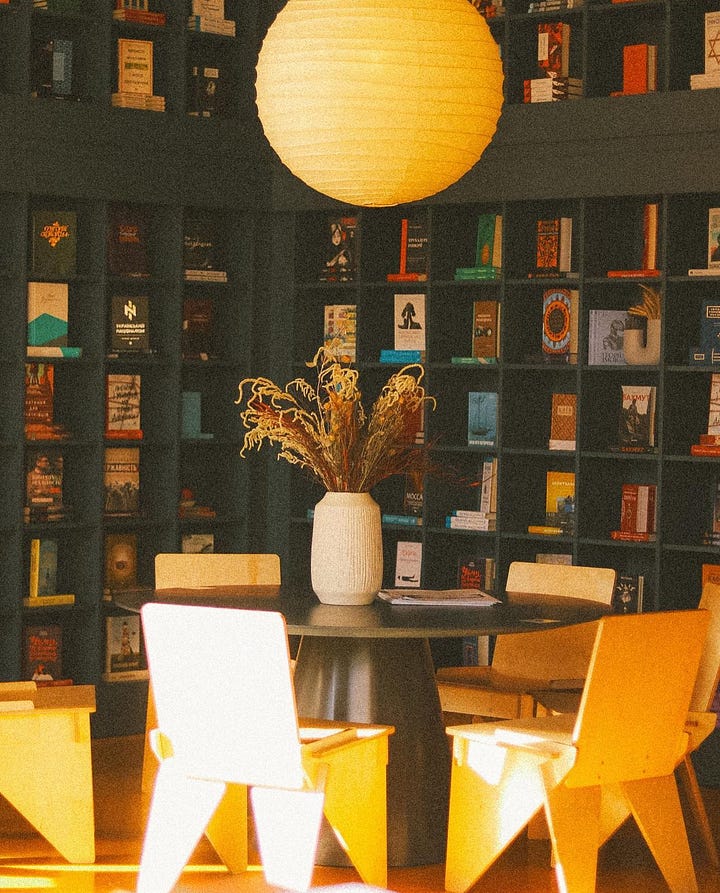Ukrainians turn to books to decolonize themselves
Russia's attack on Ukraine caused a surge of nationwide interest in Ukrainian history and literature. A newly opened bookstore in Kyiv is a perfect example of this trend.
Last month, a large crowd of mostly young Ukrainians gathered at the heart of Kyiv for an event. The place was Sens bookstore, the topic – decolonization.
It was a presentation of the podcast “Decolonizers”, hosted by two Ukrainian women Mariam Nayeem and Valentyna Sotnykova. I was in the audience too, listening to them talk about the feelings of shame and anger brought about by Russia’s imperial rule, Russian propaganda, and what constructive steps everyone could take to “decolonize themselves”. (Check it out on YouTube, they have English subtitles.)
Both the topic and the location of the event encapsulate a nationwide Ukrainian trend of rediscovering Ukrainian history and identity, the two things that have terrified Moscow for centuries.
Russia’s genocidal war brought about a huge spike in interest in all things Ukrainian.
It also kicked off a bookstore boom, with dozens of new shops opening up just in Kyiv in the last two years. The new reading spots have been attracting crowds so large I plan my visits to avoid the queues.
The act of reading itself has become politicized, and an act of resistance to Russian aggression: more and more people are ditching Russian authors in favor of Ukrainian history and fiction. A 2023 poll showed that 54% of people read in Ukrainian, a 20% increase from 2020.
The three floors of bookstore Sens, which suitably means “meaning” in Ukrainian, are almost a miniature representation of how the country struggles through its colonial history to foster a better future.
It is also a perfect example of how Russia’s war infiltrates even the most mundane of places. The war is utterly inescapable even here, even when the sirens are silent and the mornings are somewhat peaceful.
The bookstore is located on Kyiv’s main street, Khreshchatyk. Its large windows overlook the Maidan, where ten years ago millions of people organized so effectively that Viktor Yanukovych, an autocrat backed by the state police and the Kremlin, fled the country.
The shop’s entrance door informs you that you’re allowed to come in with dogs, cats, rodents, and even imaginary friends, because you are allowed to do “anything, as long as it's not in Russian.” The sign is not an actual rule but a political statement. (People will judge you, but you’ll still be served just fine if you speak Russian, as many Kyivans still do.)


Every morning at nine, the bookstore freezes for a minute of silence for the fallen soldiers.
One of the bookstore’s three floors serves as a venue for book presentations and other events, such as the podcast launch I attended. Most of the events concern war one way or the other: a book about Ukrainian women at war, a discussion about how World War II relates to Ukrainian life today, a poetry reading by writers who have joined the army and are now fundraising for their unit.
After the tragic death of a young paramedic and activist Iryna Tsybukh, known as Cheka, Sens displayed all of her recommended books (Cheka published a list on Instagram) on a separate shelf, commemorating her life’s work.


There is a permanent corner where people donate books for soldiers on the frontline.
There is another rather popular spot where Sens collects books in Russian, which are then sold for recycling to fundraise for the military. (Donating to the military has become a national habit, a thing you do as naturally as brushing your teeth in the morning.)
Eight of the ten books displayed as the store’s bestsellers are Ukrainian authors. Apart from two murder thrillers by ex-intelligence officer Illarion Pavliuk, the shelf includes a novel about Crimea, a collection of Ukrainian poetry about love, a book that dives into the lives of Ukraine’s biggest writers, and a collection of works about Ukrainian nationalism.
“There is an unbelievable boom of Ukrainian classics, because people are pondering questions about identity and philosophy, and they turn to classical literature for answers,” Bohdana Neborak, a cultural manager and editor at The Ukrainians Media outlet, told me while pouring a girl a drink from behind the bar. “People started to read more, and read more in Ukrainian.”
I met Bohdana at Basamany, a bar in Kyiv that invited her as a guest bartender – an increasingly popular event concept when influencers and activists are invited to bartend for the night.
Apart from her journalism, Bohdana is a notable figure in Ukraine’s cultural scene: she blogs and hosts podcasts about literature and reading, trying to get people hooked on the power and joy of books. She also hosts a popular book club, which meets at Sens every month.
Bohdana says that the Ukrainian reading surge is somewhat strange because the prices of paper, books, and publishing are rising all around the world. And Ukraine isn’t an exception, especially in light of Russian attacks on Ukrainian printing houses – like the obliterated Factor Druk in the city of Kharkiv – which have already destroyed tens of thousands of books.

The war has devastated Ukraine’s literary scene, and the physical threats are only part of the problem. Another is people: dozens of Ukrainian writers and artists joined the army, and some have been killed.
World-renowned Ukrainian poet and musician Serhiy Zhadan – a household name all around the country – joined the National Guard this past June. “There are no writers or non-writers, musicians or non-musicians — there are citizens of Ukraine who feel responsible for their country. The army, in principle, equalizes everyone,” Zhadan said.
Poet and children’s writer Volodymyr Vakulenko was kidnapped, tortured, and killed by the Russians in the town of Izium. The writer buried his war diary in the garden of his home, knowing that Russians were coming after him. Acclaimed Ukrainian novelist turned war crimes researcher Viktoria Amelina found the diary months later. She worked to preserve Vakulenko’s writing until she was also killed during a Russian missile strike on a popular restaurant in the city of Kramatorsk.
Yet even amid the most tragic of conditions, the industry is going through a revival to meet the demand of Ukrainians to learn about their heritage.
“For me, the weirdest and the biggest trend is that everything is not dying but blossoming,” Bohdana told me. “And I can’t explain it.”





How utterly amazing and truly inspirational. I have always been an avid reader so I understand the need to read, but reading and blossoming under such conditions is awesome.
Anastasiia, would you consider writing a post on how/where to access Ukrainian history books and literary classics in English translation? Can they be purchased directly from Ukrainian publishers and bookstores? I would love to invite the book club I belong to to read Ukrainian authors.
The Sens store sounds like a bibliophile heaven on earth!